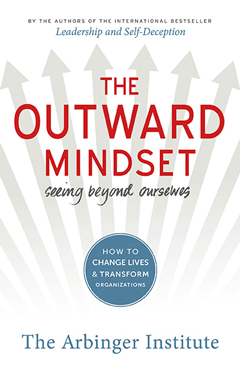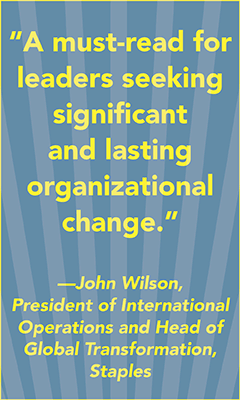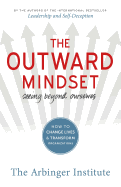The Outward Mindset: Seeing Beyond Ourselves
by the Arbinger Institute
"United we stand, divided we fall." We've all heard this proverb, but how many of us understand how to create a unity of trusting collaborative synergistic relationships? The Outward Mindset from the Arbinger Institute explains how the most effective and lasting improvements in unifying any group are driven not by imposing behavioral changes, but by changing the mindset that drives people's behavior.
The Arbinger Institute is a global leadership consulting company founded in 1979 and based in Utah, with two acclaimed books (The Anatomy of Peace; Leadership and Self-Deception) on organizational and personal change. Unlike the Institute's previous works, which conveyed their ideas in fictional form, The Outward Mindset is a straightforward nonfiction work that illustrates its points with well-told case studies. These include a Kansas City SWAT team that earned the trust and support of its community, a successful debt-collection agency that helps debtors find jobs, a steel distributor, Ford Motor Company, an NBA team, an elementary schoolteacher, and individuals who have applied this approach in their personal relationships. The stories are absorbing, and the ideas are relatively simple; they may seem mostly obvious to some, completely counterintuitive to others.
Why do you like your favorite people, ask the authors? Because they make you feel heard and seen. You feel that you matter to them. When people feel this way, when they are not micromanaged but trusted to make decisions and plan their own work, they are more invested in their group, more helpful to each other, and more productive.
The key to achieving this is what the Arbinger Institute calls an "outward mindset." In this approach, individuals consider the needs of their group as a whole, and work to be responsive, helpful and collaborative, even with those they may have considered their antagonists. Rather than perceiving other people as mere objects--tools for achieving ends, obstacles, or irrelevant--they argue that to be most effective at work and in life, we should view all others as human beings. "Seeing people as people rather than as objects enables better thinking because such thinking is done in response to the truth: others really are people and not objects."
The opposite approach is an "inward mindset" in which people are blind to the needs of others and of their group, focusing only on their personal goals, an approach that wastes time and energy through misdirected efforts and lack of collaboration. Not caring about others often requires self-justification through demonizing them. An inward mindset can also make people less assertive than they need to be. "Wanting others to think well of them (a common inward-mindset motivation), people often indulge, pacify, or placate others when direct actions would be more helpful." They also describe what they call an "Outwardly Nice Inward-Mindset Style": people who feel as if they do good things for others all the time and experience themselves as being outwardly facing, while never considering what others truly need and want from them.
Attempts to change behaviors without addressing the underlying mindsets are likely to fail. "When people see situations that need to change, the temptation is to immediately apply a behavioral solution. That seems like the fast approach. But if mindset is not addressed, it is usually the slow approach to change." They point to research by the management consulting firm McKinsey & Company that said those "who attempt to effect change by concentrating on changing mindsets are four times more likely to succeed than those who focus only on changing behavior."
The Arbinger Institute asserts that the role of leaders is to empower others to plan and carry out their own work. They should examine how any special privileges they enjoy are dividing them from their co-workers, and make transparency and truth-telling safe for employees so that they can come forward with their difficulties and collaborate on solutions. The Institute also recommends the elimination of inflexible forms of measuring success that may drive people toward an inward focus out of self-defense. They provide guidelines for implementing their ideas regardless of one's position in a given group or organization, and discuss the challenge of responding with an outward mindset to people driven by an inward one. They emphasize the importance of not waiting for others to make the first move, but to focus on what one can do to change oneself. Even so, they say, "without a guiding result that requires all employees to pull together on behalf of others, outward-mindset cultures are difficult to sustain." The full commitment of leadership is required to transform an organization, and "those who persist with an inward mindset ultimately won't be able to stay with such an organization because their staying would not be helpful to them, the organization or their customers." No matter what their situation, any reader is likely to find in The Outward Mindset an inspiring guide to creating organizations and personal relationships that are greater than the sum of their parts. --Sara Catterall








